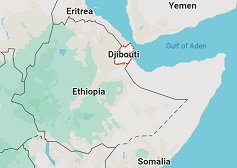The International Monetary Fund (IMF) team which visited Djibouti this week says, its debt-driven growth over the past two decades has not been resulted in sufficient employment growth.
“Djibouti’s concerted investments in logistics during the last decade have delivered efficiency and growth. As Djibouti became the main port of transit to Ethiopia, GDP growth averaged over 6 percent in 2013–2019 and ports performance increased significantly. This growth, however, was financed by debt, which reached 68 percent at end 2022. Furthermore, this was not matched by sufficient employment growth, and the combined shocks of the pandemic, the conflict in Ethiopia, and commodity price increases revealed the need for a more resilient growth model as revenues decreased and fiscal space shrunk,” said the team led by Joyce Wong, which visited the East African country from January 14-25.
The IMF issued the following statement following the visit: “In 2023, as shocks abated, growth rebounded to around 7 percent supported by stronger than projected port traffic—which grew at 31 percent up to end-September 2023—and the construction sector. Inflation is estimated to have slowed to 3.6 percent in November 2023, aided by lower energy and telecommunications costs. Staff projects that the recovery will continue in 2024, albeit at a lower pace, and subject to significant risks stemming from the situation in the Red Sea and developments in Ethiopia.”
“The uncertain regional context stresses the need for Djibouti to strengthen its resilience by overhauling its growth model, building fiscal buffers and enhancing governance. In this regard, the authorities have progressed in some key reforms. The recent creation of the public debt committee, which centralizes approvals for all public sector debt, is an important step to enhance controls over borrowing.”
“The conclusion of the preliminary agreement reprofiling with Djibouti’s main creditor would provide relief in the medium term and allow the authorities to put in place a durable and sustainable strategy for public finances. The planned creation of a large taxpayers’ unit and continued digitalization of revenue administration would improve tax collection. The upcoming MENAFATF evaluation and related reforms supported by IMF technical assistance would further enhance the country’s AML/CFT framework. The increase in human resources of the statistical agency and the ongoing census are also welcome developments.”
“Going forward, a clear medium-term vision for fiscal policy, backed by the highest authorities, and directed towards the government’s goals of growth and job creation, would ensure policy coherence and consistency while supporting revenues. In this regard, it will be essential to centralize control over fiscal policy, including through the creation of a tax policy unit in the Ministry of Budget together with the unification of the legal framework for tax policy under the tax code.”
“The ongoing review of military base leases should not only ensure their fair value today but also include an indexation mechanism to protect future revenues. As inflation continues to subside, it will be important to carefully weigh the tradeoffs of continuing with untargeted fuel subsidies in a country with deep development needs.”
“Concerted action would ensure that State-Owned Enterprises (SOEs) and the Sovereign Wealth Fund play a key role in supporting inclusive growth, given limited budget resources. In this context, accelerating the implementation of the Code of Good Governance is critical. To this end, empowering the Executive Secretariat of the State Portfolio with strong political buy-in and adequate resources would be an important first step.”
“Transparent financial reporting for all SOEs and a clear dividend policy, along mutually agreed performance parameters, would help support the budget while ensuring that SOEs have adequate resources to fund operational and investment costs. Staff supports authorities’ plans to consolidate administrative SOEs and urges accelerating the technical work.”
“The authorities are cognizant that key constraints to increasing employment include high telecom and energy costs, weak private sector job creation, and informality. They are committed to lowering telecoms costs, including by further liberalizing the sector. In this regard, strong corporate governance and financial transparency will be essential to attract private interest,” IMF said.
